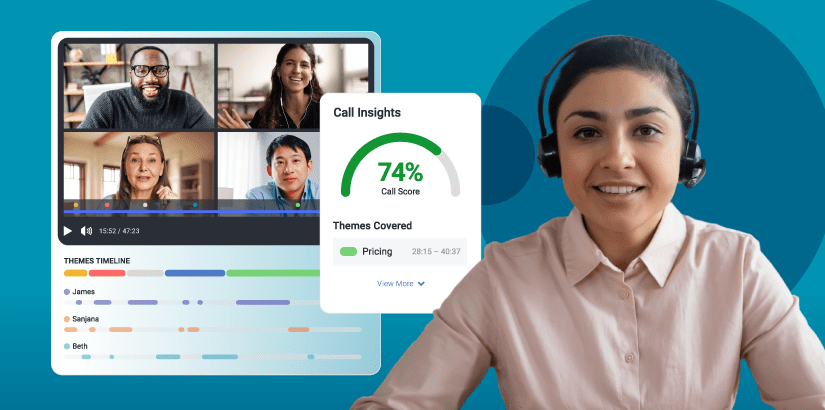How Conversation Intelligence Puts Sales Coaching Into Overdrive
It might not come as a surprise that 57% of sales reps are expected to miss their quotas in 2021. Sellers often can’t explain why deals don’t work out, leaving your sales managers in the dark. Knowing a seller lost a deal isn’t enough to prevent it from happening again. Your sales managers need the ability to identify why deals are lost and how they can train and coach reps to win today’s deal — and every deal in the future.
Conversation intelligence solutions offer invaluable support to sales managers. These solutions record, transcribe and score customer calls, serving them back to sales managers to use as fuel for more effective coaching conversations. Managers gain insights into the seller’s performance, pinpoint areas of concern and develop targeted coaching techniques to improve outcomes. These solutions take the guesswork out of why deals were lost, giving visibility into every touchpoint of the sales cycle – from the pre-qualification call all the way to closing the sale.
In this blog post, we’ll walk through the sales cycle and offer up some AI-driven coaching opportunities each step of the way.
Pre-qualification call
The seller’s goal at this stage is to determine if the account should advance to the next step in the sales cycle or be sent back to marketing for further nurturing. Conversation intelligence gives managers insights into a seller’s missteps, potential skill gaps and the customer’s experience during the call. Opportunities for coaching could include:
- Showing examples of performers in action and facilitating peer reviews: Did the rep nail the call or launch into an extended sales pitch? Maybe they focused too much on the solution vs. listening to the buyer. Have your seller learn from the best by reviewing a recording of a model pitch. Discuss how the model differed from the rep’s pitch then have the rep practice their pitch and submit a recording for a manager or peer review. You can then use AI insights to analyze the recording and identify areas for improvement.
- Sharing a relevant learning module and AI-based insights: Was the rep able to gather the critical details they needed to pre-qualify the account, e.g., the customer’s challenges and goals, their current solution, their willingness to spend, the influencers and decision-makers in the buying cycle, etc.? To strengthen the rep’s ability to uncover this important information, share AI-based insights from the call around specific themes and topics, and then discuss how to listen and respond to these verbal cues. You can share a short learning module with them on how to pre-qualify a lead and then ask the rep to get certified on this training before the next pre-qualification call.
- Assigning a learning course and using role-play to measure improvement: During the call, did the seller engage in active listening, letting the buyer describe their situation? Or did they talk too much and interrupt the customer? Show your rep an analysis of the call, focusing on the ratio of time spent talking by the rep versus the buyer. Then share an active listening course, including the appropriate ratio of listening to talking at this stage, and how to paraphrase what was heard in the conversation and ask for confirmation. After the course is completed, have the rep role-play to demonstrate proficiency in active listening.
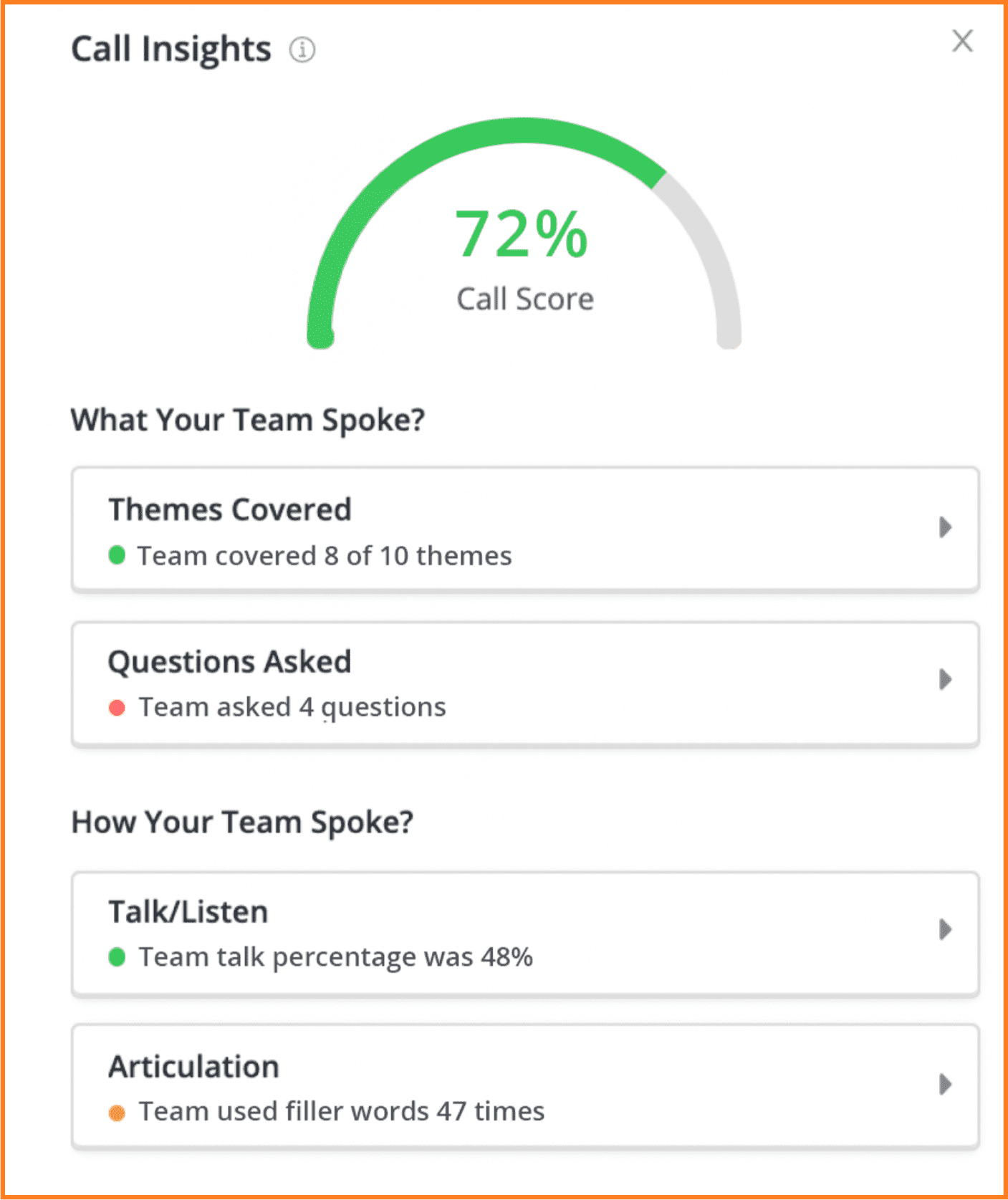
Discovery call
During this stage of the sales cycle, sellers are focused on reviewing buyers’ needs and criteria for selection, getting a clear view into the buying process and the other decision-makers involved. Managers can use conversation intelligence to review the seller’s performance during the call and inform coaching strategies that can improve their ability to uncover critical details. Opportunities for coaching could include:
- Assigning micro-learning modules: Did the seller identify the other solutions the prospect is evaluating? Did they find out what stage of the sales cycle they’ve reached with each vendor? Were they able to discover how the buyer perceives the competition (pros and cons)? Point the rep to micro-learning training modules on competitors’ solutions so they can learn how to probe for the buyer’s perception of competitors and set traps as the sales cycle progresses.
- Sharing tips from training experts: Did the seller miss the chance to explore opportunities to upsell and cross-sell? Direct the rep to a video with tips on upselling from sales training experts. Share snippets of conversations between other sellers and customers to give the rep examples of how to apply those skills in real-world scenarios.
- Leveraging AI insights to pinpoint concerns and practicing critical skills to close gaps: Was the rep able to uncover more insight into the other decision-makers? Could they identify those stakeholders’ top concerns and pain points? Use intelligence features such as search, keyword identification and timeline analysis to ensure the rep asked the right questions. Have the rep practice how to ask buyers required questions and how to probe for answers.
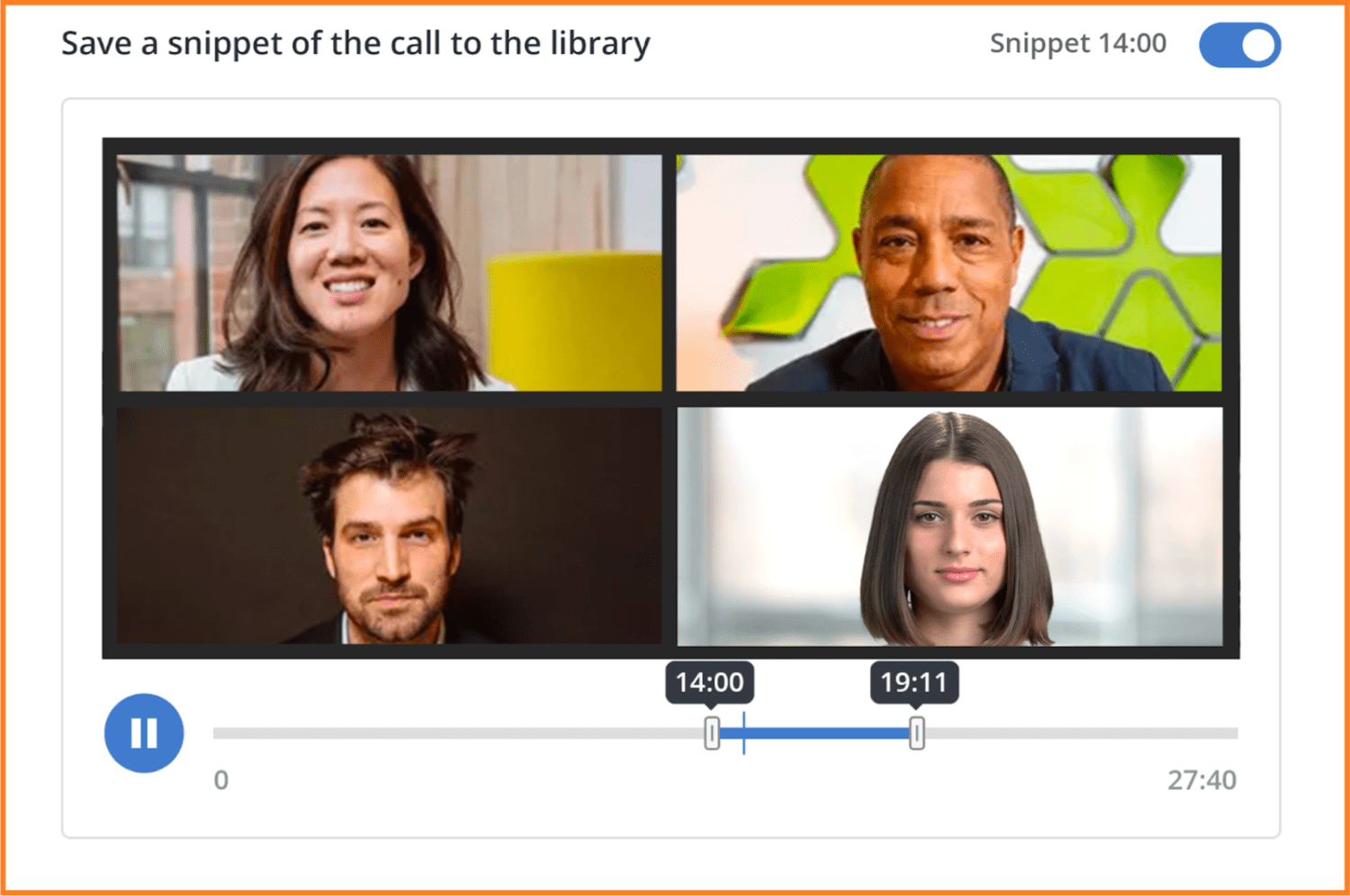
Evaluation call
The seller’s goals during this stage are to provide all of the information necessary for the buyer/buying committee to make a purchase decision and collect all information needed to put together a proposal to be discussed on the next call. Using conversation intelligence, managers can pinpoint ways to strengthen the rep’s role as a trusted advisor and reduce negotiation friction later in the sales cycle. Opportunities for coaching could include:
- Reviewing top-performing demos and using role-play: Presenting a demo is a critical moment in the sale cycle. It’s proof of everything the seller has already discussed with the buyer and most importantly, the solution’s value relative to the buyer’s challenges. To help your rep prepare and go into this meeting with confidence, have them engage in a role-play to ensure the demo is engaging and relevant. Expose them to real-world scenarios and successes by reviewing recordings of top-performing demos and pointing out the key areas of excellence.
- Analyzing the call for insights into the buyer’s experience and providing feedback: The buyer needs to leave this meeting fully understanding the product and how it will address their unique challenges. Use conversation intelligence to determine the buyer’s sentiment and open questions to make sure there’s no confusion or frustration during the demo. Discuss how the rep could have improved their understanding of the product and how it aligns with the buyer’s needs.
- Quizzing the rep to keep knowledge fresh: Was the rep able to show how the solution is a better fit and better value compared to the other technologies being evaluated? Or did they miss the mark by using outdated messaging and positioning? Quiz your reps periodically on competitive positioning and features so their knowledge about the competition is reinforced and up to date. If needed, have them review existing competitive intelligence assets.
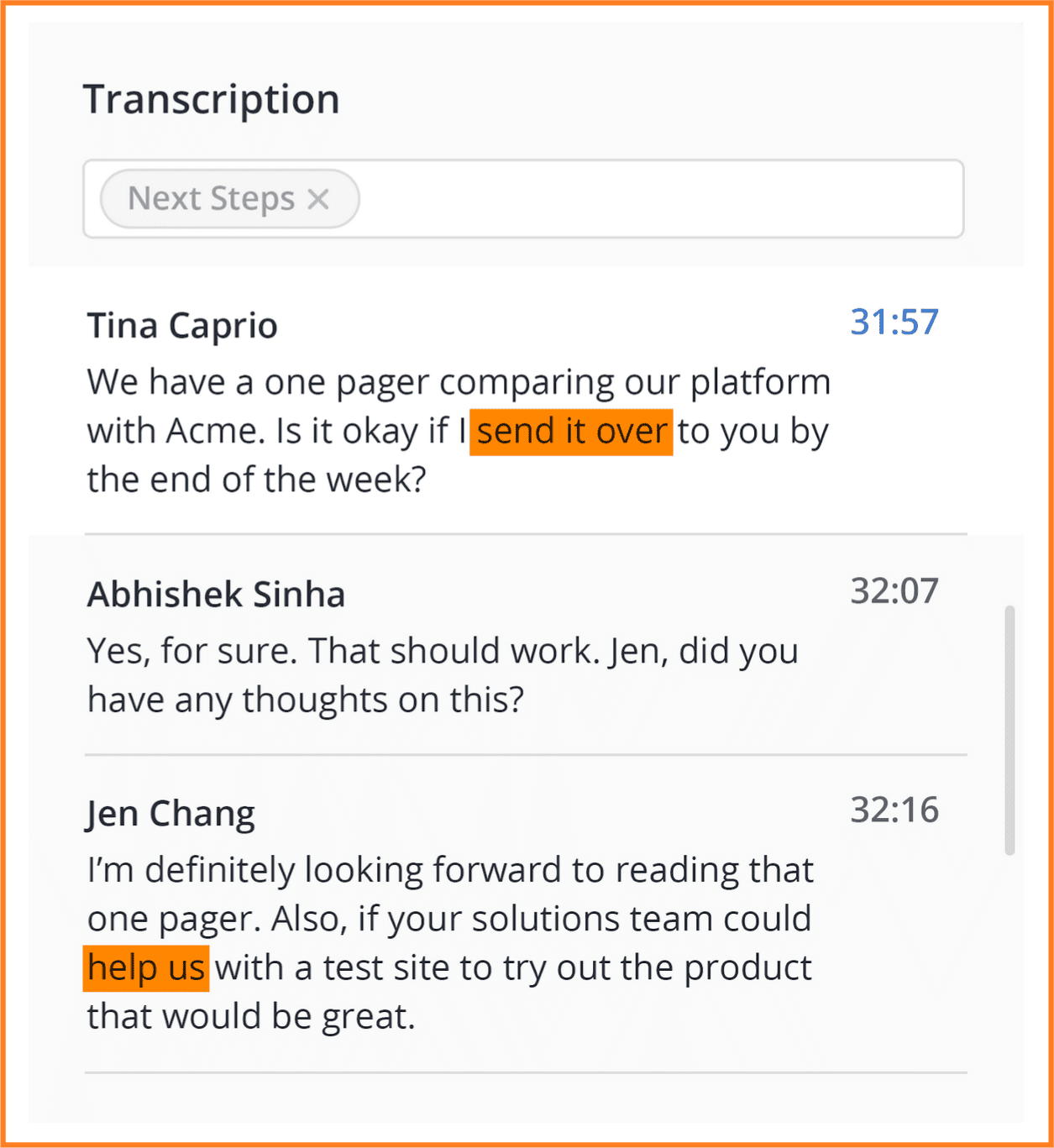
Negotiation call
The seller’s goal is to close the deal and ensure all necessary elements are in place to put together a contract that will be signed by the buyer. Conversation intelligence enables sales leaders to review rep performance and provide laser-focused feedback on how they can sharpen critical negotiation skills. Opportunities for coaching could include:
- Scheduling a one-on-one to review past calls and prepare for potential objections: It’s imperative the seller presents options (i.e., length of contract, terms) and product/service bundles that are relevant to the buyer’s needs. It’s also important that they avoid resorting to discounting. Set up a one-on-one the day before the next negotiation call to review the details of the deal, prospective discounts and potential objections and to work with the rep on any areas of concern. Review how the call went, identify areas of concern and provide feedback and guidance.
- Using role-play to build confidence and trust: When a buyer is about to make a big investment, they need reassurance that they are making the right decision and that the company is dedicated to partnering with them on their long-term success. To ensure the rep comes across as confident and maintains a partnership approach to the conversation, have them role-play situations where the buyer makes various demands and/or takes an adversarial stance.
- Showing examples of what a successful negotiation looks like: Your seller needs to make sure all parties are on the same page before concluding the call. Did the rep provide a summary of what was agreed to, define clear next steps and answer all questions? Coach the rep on best practices for summarizing at the end of a negotiation call and following up. You can do this by showing them what a successfully closed deal looks like using snippets of call recordings, prescribing role-plays so they can practice different techniques and finally identifying and fine-tuning areas of concern using AI-driven insights.

Purchase call
The seller’s objective at this stage is to review the contract with the buyer and discuss any pending issues – clearing the path for the buyer to sign a contract and start the onboarding process. Conversation intelligence enables sales managers to analyze the seller’s ability to guide the conversation, demonstrate confidence and identify coaching techniques to improve these skills. Opportunities for coaching could include:
- Measuring the rep’s performance and the customer’s experience: What was the rep’s approach to asking the buyer about the status of the purchase? Were they actively listening to the customer’s concerns and questions, and understanding any obstacles to signing the contract? Analyze insights to measure the rep’s listen-to-talk ratio and customer sentiment. Then review the recorded call with the rep to ensure the buyer did most of the talking and left the call satisfied.
- Testing the seller’s knowledge: The buyer will expect to leave the call with important details and actionable information like the onboarding and training processes, customer support terms, pricing, implementation start date, and more. To prepare your seller, assign a quiz measuring knowledge of all contract-related terms and processes. Assign a targeted learning module based on any knowledge gaps, and then assign the quiz again to measure improvement.
- Comparing the rep’s performance to best practices: How well did the rep manage the call? Did they check all the boxes by summarizing the discussion, committing to making changes in the contract as agreed to during the call, and setting expectations for when the buyer would have it signed? Analyze the rep’s performance for highs and lows, and discuss findings and feedback. Finally, show the rep a recorded call of a successful close and follow-up to reinforce your discussion.
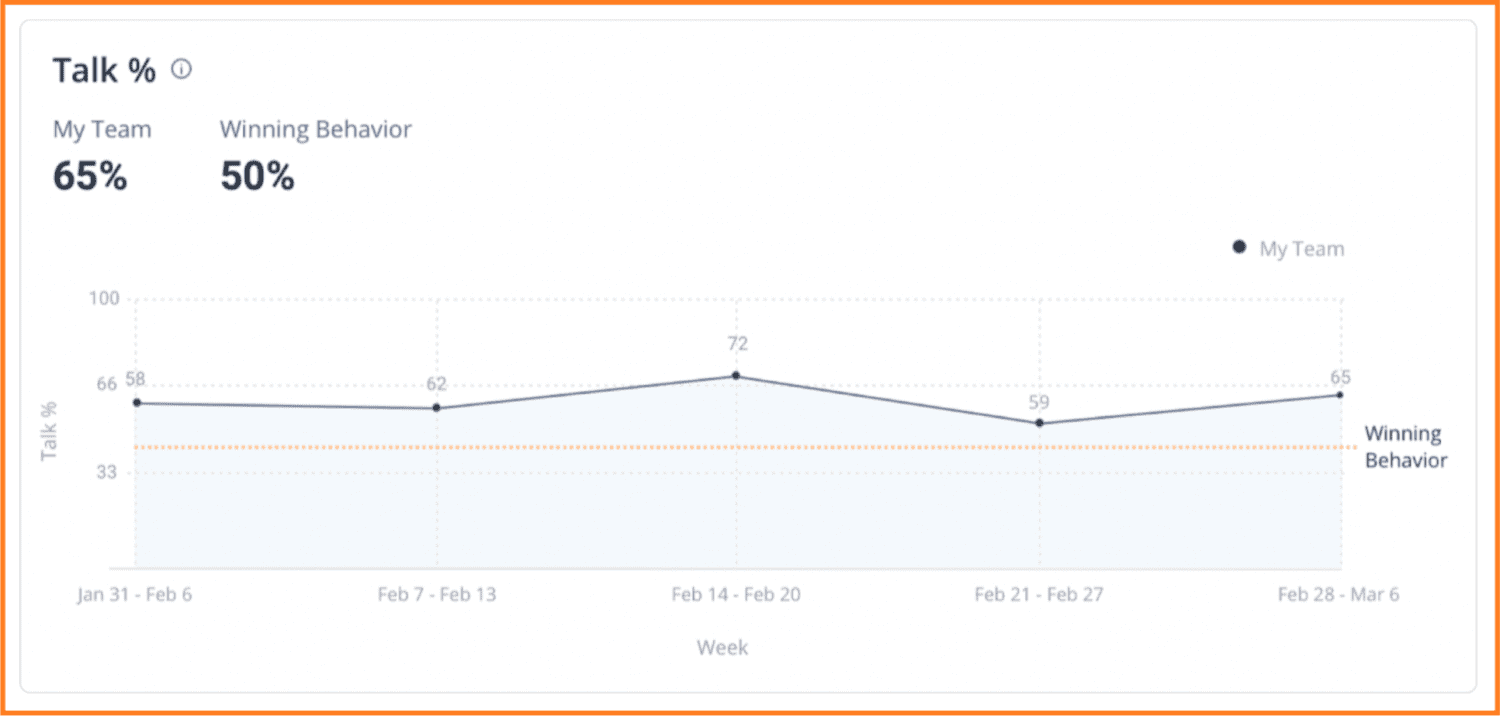
Call AI, Mindtickle’s conversation intelligence solution built into our comprehensive readiness platform, uniquely helps you identify and fix the real-world behaviors that stop your salespeople from closing every deal. Critical coaching moments happen at every stage that can drastically impact deal outcomes. Conversation intelligence, when paired with a readiness approach, gives you the ability to steer reps toward closing their current deals at every step in the process, and then arm them with the skills they need to close future deals with greater success.
To learn more about how sales managers can use conversation intelligence to optimize coaching techniques and improve business outcomes, book a demo.

